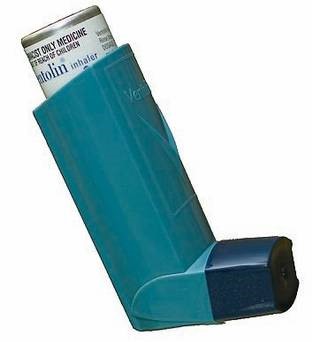Asthma is the most common chronic condition.
It affects one in eleven children and there are over 25,000 emergency hospital admissions each year in the UK for children with asthma.
A recent Asthma UK survey found that 86% of children with asthma have at some time been without an inhaler at school and up until now it has been illegal for schools to hold Emergency Salbutamol Inhalers (pictured left) for the use of pupils whose own inhaler was not available.
However, from Wednesday 1st October 2014 the Human Medicines (amendment) Regulations 2014 will now allow schools to keep an Emergency Salbutamol Inhaler for use in emergencies.
So what does this mean for schools?
Well, it applies to all schools, both Primary and Secondary although they are not required to hold an inhaler. This is discretionary, enabling schools to do so if they wish and is only to be used by children who have been diagnosed with asthma and prescribed an inhaler or who have been prescribed an inhaler as a reliever medication.
The school will need the written consent of the parent and it can only be used if the pupils prescribed inhaler is not available, for example; lost, broken, empty or expired. It certainly does not negate the need for pupils to have their own prescribed inhaler.
Should a school wish to implement the use of an emergency inhaler there are a number of changes necessary to school policy, if you are unsure of how this might affect you please make contact with the person responsible for health and safety in your organisation.
- The policy must set out how and when the inhaler should be used
- It must include how the equipment will be stored, how it will be cared for and by whom and how the inhaler/spacer will be disposed of after use
- Details of the training and support that will be provided for staff
- Written parental consent for the use of the emergency inhaler will need to be included in individual healthcare plans
- At least two volunteers must be appointed to be responsible for ensuring the Emergency Salbutamol Inhaler policy is followed
- A register/record of children in the school that have been diagnosed with asthma or prescribed a reliever inhaler should be kept – a copy of which should be kept with the emergency inhaler
This can be incorporated into current medication policies – if you would like some advice, or if you require your medication policies updating we can help you so please get in touch with us.

Emergency Salbutamol Inhaler with Spacer
Schools can purchase small quantities of inhalers and spacers without a prescription from a pharmaceutical supplier and they may wish to discuss with their community pharmacist the different plastic spacers (pictured in use left) available and what is most appropriate for the age-group in the school.
Community pharmacists can also provide advice on use of the inhaler but they cannot provide inhalers and spacers free of charge – there will be a charge for them.
In order to obtain one you will need a written request from the principal/head teacher stating the name of the school, the purpose of the inhaler and the quantity required.
Your emergency kit should include:
- Salbutamol inhaler
- At least 2 single-use plastic spacers
- Instructions for use and the manufacturers information
- Instructions for cleaning and storing the inhaler
- A checklist of inhalers including batch numbers and expiry dates
- A list of children who can use the inhaler
- A note of the arrangements for replacing the inhaler and spacers
- A record of administration – when and where the inhaler has been used
Deciding to keep an inhaler for emergency use has many benefits, not least that it could prevent an unnecessary trip to hospital for a child, and potentially save their life.
If you would like any advice on how to implement these changes, or if you would like to discuss the feasibility of these changes for your school then please get in touch with us on 0117 958 2070.
You can also e-mail Sarah on sarah@acornsafety.co.uk – Sarah is a registered nurse and our lead advisor on all matters relating to medication policy and training and would be pleased to answer any questions you might have.

